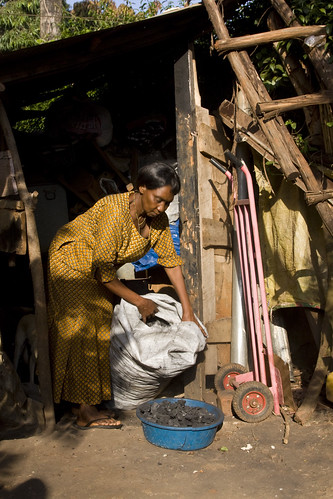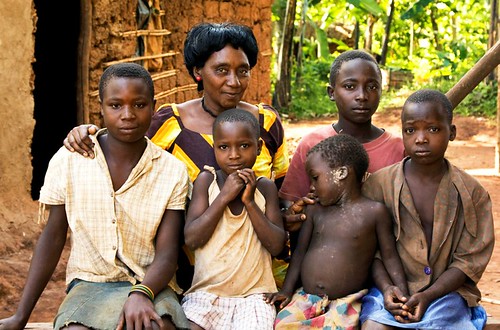I am slipping back more and more into the life I once knew, knowing I will never quite be the same again, but I have once more grown accustomed to traffic and paved roads; the selection of a hundred cereals and dozens of cooking oils at the store; news, music, advertisements, cell phones, laptops, televisions and pdas a constant affront to my senses. I am getting a little impatient again, and a touch ungrateful. Expectations are swelling, so is my sense of me: I want to do this; I don't want to do that. The aura of duty and service dwindling. When will I get a job? When will I get money?
I spoke with Emma this morning. She is my Ugandan cousin, my Aunt Vinnie's daughter whom I stayed with often in Kampala, sometimes running around together in the capital going to muzungu bars and waking up the next morning with headache thinking, man I'm old.
There was a boy that stayed with their family, one of their cousins. He often parked himself on the couch next to the T.V. in the large sitting room, watching Ugandan music videos, dubbed telenovella or maybe a pirated DVD rented from the shop around the corner. The boy rarely spoke, sitting with his jaw always ajar, his eyes dully watching the world around him. He didn't like going to school, preferring television and video games. Emma told me he stayed with them because he was good friends with Derrico, their youngest sibling, and because he would attend classes for his kind Aunt Vinnie.
And then one morning I awoke at their house some months ago to find all the younger kids gone to school, but Joseph still sitting in front of the TV.
"You should go to school, Joseph. Just cause Aunt Vinnie isn't here today doesn't mean you shouldn't be in class," I yelled to him from the kitchen. He didn't even look at me, still watching the T.V. with his mouth agape. What a weird boy.
Emma sort of laughed behind me going in and out the kitchen to make food on the charcoal stove outside.
"He doesn't like to go because he' sick," she said softly so he couldn't hear. "He says there's no point because he is going to die."
"What?" I asked, although I needed to further explanation.
"He's got HIV."
She told me the boy was very sick and actually older than Derrico, although he looked two or three years his junior. After that I watched him more, noticing the sick child smiled around his cousin, I think the only time I saw him smile, laughing while thoughtful and ebullient Derrico played video games. I saw Joseph and Derrico together all the time the first several months I visited Vinnie's, but then around the holidays or maybe it was after the beginning of the year, Joseph was noticeably absent from their sitting room, the seat next to the T.V. empty.
"He's sick," Emma responded when I asked about the boy. "He went back to stay with his father. Mommy couldn't take care of him all the time."
And I never saw him again.
And then this morning, thousands of miles and moments away, I got an email from Emma. She'd been busy with exams, she hadn't heard from my kids. Oh, and our cousin Joseph had passed away about three weeks ago.
I called her immediately.
"He kept getting better then falling sick again," she said.
"Was he taking his medicine?"
"Yes. Mommy was taking care of him. But one day he just closed his eyes," she explained plainly as a red-tailed hawk flew overhead casting me in its shadow, while I sat by my parent's pool that rests on a hill overlooking swaying eucalyptus trees in a chaparral canyon, cars on well-paved roads below us going to work, dropping children off at schools, the things I was growing accustomed to slamming into the things I could easily forget.
"Derrico cried," she added of her little brother. Ugandan men and boys never cry, she didn't have to tell me. I hung up the phone feeling shameful.
I don't have any pictures of Joseph, but I wish I did. Here are some pictures of Aunt Vinnie and Derrico in their backyard the morning of a solar eclipse.








